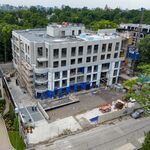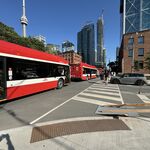It's not straight forward and you've simplified it beyond what is possible. Unless fares double, riders will not be generating money to pay for the service they use plus interest. Any money for interest will be 100% paid by the city. The interest rate is also often not fixed. Toronto has floating rate debt, simply because investors won't give them fixed rates when needed, or effective variable rate debt as they use short term lending as needed to make budgets and every time they borrow they take up market rates.
And this totally ignores the principal. When is that going to be paid back and how? What will be the interest rate when that is rolled over? Someone above said interest rates will never go past 10, that central banks would never allow that: how laughably fast history is forgotten.
The subway is the biggest (only) money making venture of the network. It makes a profit on each rider assuming they didn't take a bus to get there. If all other service along the route was held constant and a subway built, revenues would increase and you'd have a net increase that could go to paying the bonds. And and fraction of the toll normally allocated to capital costs goes towards the bond since in essence that what it is. Oh and if the tolls don't cover the payment costs completely, we just hiked property taxes +1% specifically to pay for transit which I'm sure could cover the remainder. Hold that increase for the duration of the bond and you're set.
Are you sure Toronto doesn't get a fixed rate? I had always thought that was the case, and
this Start article discussing Toronto's debt contains this line:
The rate is fixed for up to 40 years, so as inflation rises, the cost to pay for an asset does not, even if its value goes up.
Seems to be confirmed by this blurb from a
Bloomberg article in 2010:
Toronto’s 5.2 percent bonds due in June 2040 yield 4.66 percent, compared with 4.20 percent for the Port Authority of New York and New Jersey, which is financing the reconstruction of Manhattan’s World Trade Center. Its 5 percent bonds maturing in July 2039 are rated Aa2 by Moody’s, one rank below Toronto’s Aa1 rating.
The rates from sale to sale differ but only the yield (what you get on the secondary market based on resale value) is changing constantly. The City pays the agreed upon rate year after year.
Also municipalities don't have the luxury of rolling over debt like the Provinces and Feds. The repayment schedule is such that the principal is amortized over the life of the bond and will be paid in full by the maturity. The amount of interest you budget is what you will end up paying, because you're forced to legally. That is, according to the
City's website.
Lastly, you're right about massive interest rate spikes in the past. This may sound naive with respect to how quickly things can change but with the popularity of Keynesian economics, I think Rainforest is right in that the central bank wouldn't let that happen. Then again, what I've stated above kind of makes this irrelevant.




